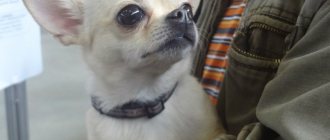The Chihuahua is a miniature dog, ideal for keeping in an apartment. Unlike most decorative breeds, these dogs are generally in good health. On average, they live up to 12-15 years, but there are also centenarians who live up to 20 years. However, the owner should be aware of the signs of possible Chihuahua diseases. Our article is devoted to a description of their features.
Chihuahua diseases: symptoms and treatment
Why does a Chihuahua tremble?
In general, for representatives of this breed, especially smooth-haired ones, trembling is a common condition. However, if your pet is shaking more or more often than usual, this is also worth paying attention to.
The dog may be shivering due to the cold
So, if the baby only trembles during walks, this means that he is freezing and it’s time for him to get dressed.
Sometimes trembling is a sign of nervous feelings. For example, if the dog has misbehaved and expects punishment or is afraid of something else. When frightened, the dog may still tuck its tail. Nervous tremors are a common occurrence and there is nothing dangerous about them.
However, in some cases, shaking can be a sign of illness. It is important to pay attention to it in time. Usually, if the shaking is unhealthy, it will be accompanied by other symptoms.
Diseases accompanied by tremor:
- hypoglycemia;
- poisoning;
- allergy;
- kidney diseases.
Additional information to answer the question why a dog is trembling can be found in the article on our website.
Video - Why do Chihuahuas tremble?
Chihuahua gets sick: what to do
At the first sign of illness, do not panic. It is necessary to provide the pet with peace by isolating it in a separate room. Remove sources of noise and curtain the windows so that bright light does not irritate or interfere with sleep. Provide the animal with a comfortable temperature and absence of drafts in the room. If the dog refuses to eat, you should not insist on feeding, but you need to monitor the amount of water he drinks. Walking time is reduced, and if necessary, sneezes are left at home. If his condition worsens, you should seek help from a veterinary clinic, where a doctor will evaluate the symptoms and prescribe treatment.
General signs of diseases
To notice that a dog is unhealthy, it is usually enough to take a closer look at its behavior and condition. It is worth paying attention to the following manifestations:
- lack of appetite or poor appetite for more than 24 hours;
- temperature is too high (38-39 degrees);
- diarrhea and vomiting;
- constipation;
- frequent sneezing, coughing;
- sudden weight loss;
- uneven breathing;
- itching, dandruff, parasites;
- bloated stomach;
- convulsions;
- discharge from the eyes, ears or nose;
- constant strong thirst;
- uncontrolled urination;
- lameness;
- lethargy, apathy, fatigue.
If you suspect a disease, contact your veterinarian
If any of these signs occur, you should take your dog to the veterinarian for an accurate diagnosis and treatment.
How do you know if your dog is sick?
Symptoms that indicate that a Chihuahua is feeling unwell or is sick are divided into behavioral and physiological. The first include lethargy, apathy, aggression, drowsiness of the dog, loss of appetite, refusal to play and walk. These signs do not provide a clear picture for making a diagnosis, so physiological changes are taken as a basis:
- increased temperature – characteristic of inflammation, poisoning, helminthiasis;
- decrease – enteritis, oncology;
- vomiting, diarrhea, constipation - problems with the gastrointestinal tract, pancreas;
- discharge from the nose, ears and eyes – allergies, ear mites;
- change in color of mucous membranes – liver disease;
- peeling of the skin – scabies, dermatitis;
- wheezing – damage to the respiratory system;
- hair loss – vitamin deficiency, allergies, hyperthyroidism, worm infection.
If a Chihuahua doesn’t feel well or behaves differently than usual, this is not necessarily a disease. It is necessary to monitor the dog and if the condition worsens, seek help from a veterinarian.
Genetics
Patella dislocations and hip dysplasia in Chihuahuas can be caused by hereditary abnormal joint structure. Similar non-inherited defects are less common. With this pathology, even in childhood, the puppy begins to limp. In such a situation, the veterinarian prescribes an x-ray for an accurate diagnosis. Therapy or surgery is prescribed.
Sometimes heart pathologies, eye diseases, skin diseases, undescended testicles, and so on can be hereditary. For this reason, it is very important to purchase a puppy from reliable manufacturers in specialized nurseries with a good reputation. Responsible and respectable breeders do not allow dogs with hereditary defects to be bred.
Patella dislocations and hip dysplasia in Chihuahuas may be caused by hereditary joint abnormalities.
Attention! If the puppy is nevertheless purchased from your own hands, it is advisable to conduct a full veterinary examination so that if there are any pathologies, they can be treated as early as possible. In some situations, surgery may be required.
Hydrocephalus
Chihuahuas are the only dogs that are born with an incompletely formed skull. They, like human newborn babies, have a fontanel. The cranial vault is finally formed only by three to four months of age. This feature predisposes the breed to hydrocephalus. It may also be due to heredity.
Chihuahuas are the only dogs that are born with an incompletely formed skull.
Symptoms of the disease are noticeable in puppies from two months. When choosing a puppy, pay attention if he often throws back and tilts his head, or becomes dizzy. Convulsions are possible.
Treatment is carried out only by a doctor. Drugs are needed to reduce intracranial pressure, and sometimes surgery.
Epilepsy
The first manifestations of epilepsy are observed between the ages of 9 months and 3 years. Before an attack, the dog gets nervous and looks for a secluded corner. A convulsive attack may be accompanied by severe salivation and involuntary bowel movements. The duration of the attack is about one and a half minutes. With age they become more frequent. The disease, unfortunately, is incurable, but you can live with it. The doctor will prescribe medications to suppress seizures and select their dosage.
Epilepsy is incurable
On a note! Any noticeable seizures in a dog, even mild ones, is a reason to immediately contact a veterinarian, as this may be the first manifestation of epilepsy. You can read more about this disease in dogs in our article .
Digestive system
Digestive problems can result not only from poor nutrition, but also from hypothermia. Another common cause is overeating. Under no circumstances should a Chihuahua be overfed or fed with “goodies” from your table. Both of these ultimately lead to obesity. Obesity in Chihuahuas is a cause of chronic digestive problems, heart disease and, ultimately, a significant reduction in life expectancy.
Obesity is a common condition in Chihuahuas.
Symptoms:
- diarrhea;
- vomit;
- lethargy;
- poor appetite.
Diarrhea
Diarrhea can be a consequence of overeating, poisoning, allergies to certain foods, worms or infection. If we are talking about overeating or poisoning, the dog’s intestines are cleansed before starting therapeutic procedures. To do this, you will have to force her to drink a spoonful of castor oil. During treatment, strong tea is added to the pet's drinking water. In case of a food allergic reaction, it is necessary to exclude the product that caused it from the diet. For this reason, any new foods are introduced into the diet gradually, one at a time, so that you can immediately determine what exactly led to the reaction.
Diarrhea can be a consequence of overeating, poisoning, allergies
Attention! If the cause of diarrhea cannot be determined and eliminated, you should consult a veterinarian. Sometimes severe diarrhea can be a symptom of a serious infection.
Constipation
Constipation can occur, for example, due to dry food, coarse fiber, too strong broth, or bones. In most situations, constipation can be eliminated without visiting a veterinarian. In the easiest case, it is enough to feed the dog kefir. Other common remedies are castor oil, vegetable oil (you will have to give it forcibly) or an enema. On the recommendation of a veterinarian, lactulose-based medications can be used. To avoid frequent constipation, you should monitor your pet’s diet.
Kefir can help treat constipation in dogs
Tracheal collapse
Tracheal collapse can be either an acquired problem (due to obesity) or a congenital pathology, which can cause not only serious breathing problems, but also the death of the dog. Softening of the tracheal rings leads to its narrowing. With the development of the inflammatory process, mucus begins to accumulate in the trachea. The dog experiences attacks of suffocation, coughing, shortness of breath, and rapid breathing. The animal behaves restlessly and rushes about. The dog needs to be treated comprehensively: a special diet to eliminate obesity in parallel with medications to relieve inflammation. Timely treatment often allows the problem to be completely eliminated.
Similar article: Dimensions and appearance of the Chihuahua breed according to the standard
The cardiovascular system
Heart failure is most common in older Chihuahuas. This disease can be fatal, so special attention should be paid to its first signs in order to begin treatment measures on time.
Symptoms:
- dyspnea;
- cough;
- uneven, shallow breathing;
- bluish color of the gums and tongue (appears in later stages).
Heart failure is most common in older Chihuahuas.
Respiratory system
Problems with the respiratory system can become a complication or consequence of an untreated cold. In addition, they can develop due to infection, heredity, obesity, heart pathologies and inhalation of harmful substances (cigarette smoke, gasoline exhaust, dust, household chemicals).
On a note! Coughing, uneven breathing, shortness of breath, and restless behavior may be signs of tracheal collapse.
The doctor may prescribe antibiotics or other drugs depending on the cause of the disease and its stage.
The most common diseases
Chihuahuas are susceptible to common diseases that affect most dogs. Due to anatomical features, some ailments are unique to this breed.
Veterinarians often diagnose the following diseases:
- allergy;
- dental problems;
- ophthalmological diseases;
- gastrointestinal disorder;
- skin diseases;
- epilepsy;
- pathologies of the respiratory system;
- parasitic infestations;
- various infectious and colds.
In addition to these problems, there are frequent cases of cryptorchidism, diseases of the musculoskeletal system, rheumatism, hypoglycemia, hydrocephalus, and cardiovascular failure. Even the good health of the breed sometimes succumbs to serious illnesses. You should especially carefully monitor the condition of your eyes and teeth, because these are the most vulnerable places. Poor nutrition is the main cause of most animal health problems.
Teeth and gums
Teeth are one of the weak points of this breed. It is important to regularly check their condition and start caring for them from an early age. Baby teeth may not fall out on their own, in which case they must be removed, otherwise the dog will develop an overbite. Fractures of the lower jaw are common. Caries, pulpitis, etc. are common.
Teeth are one of the Chihuahua’s vulnerable spots.
Prevention
To avoid dental diseases, she has her teeth brushed once a week. Plaque is removed at the veterinary clinic approximately once a year.
Unexplained cough
If your pet is coughing, there may be several reasons. The unusually short structure of the head of Chihuahua dogs does not allow them to breathe deeply, especially during a sharp transition from a calm state to an excited one.
This is a common occurrence for such dogs; there is no need to worry at such moments. Distract the baby, calm him down - gently pick him up and stroke him. If it doesn’t help, close its spout with your hand for a few seconds to equalize the air pressure.
But if coughing attacks become more frequent, consult a doctor. Your dog may be having an allergic reaction to an external irritant or contracting a viral infection.
Eyes
The most common cases are progressive retinal atrophy, keratoconjunctivitis (dry eyes), glaucoma, and cataracts. Swelling, lacrimation, purulent discharge, redness, inflammation are signs of such diseases. Another possibility is loss of eyeballs due to the structure of the skull. This is possible in small puppies due to injury. In such a situation, urgent veterinary attention is needed.
Retinal atrophy in dogs
To prevent eye diseases, you should regularly examine and wipe with a cotton swab dipped in tea infusion or saline solution.
Keratoconjunctivitis
With this disease, the cornea of the eye becomes inflamed and interferes with the production of tears. As a result, the eye dries out. The result can be decreased vision and even blindness. The causes of the disease can be different - heredity, injury, infection, problems with the immune system, consequences of unsuccessful treatment of other diseases.
Keratoconjunctivitis
Symptoms:
- dull, reddened eyes;
- discharge from the eyes;
- irritation.
If your dog blinks frequently, rubs its eyes with its paw, or has difficulty opening its eyes after sleep, you should immediately consult a doctor. In advanced cases, surgery may even be necessary. In milder cases, the veterinarian will prescribe drops to moisturize the eyes and stimulate the production of natural tears.
Demodicosis
The causative agent of this disease is the scabies mite. The disease is contagious.
Attention! Ticks that cause demodicosis are dangerous not only for dogs and other pets, but also for people.
Demodectic mange in a dog
Signs of demodicosis are hair loss, severe itching, sores on the skin, and the animal does not eat well. If a dog is diagnosed with this disease, a course of treatment will be required, which will be prescribed by a doctor. This can be a series of injections and/or external remedies (ointments, creams to fight parasites and heal the skin). The apartment urgently needs to be thoroughly cleaned and the dog bedding must be disinfected or destroyed.
Unpleasant odor from a Chihuahua - pathology or breed feature
The owners of these small dogs often ask the question on specialized dog lovers forums: “Why does my Chihuahua stink?” Some novice owners are sure that this is a breed feature. Yes, all dogs have a specific smell. Some breeds smell stronger, others are less smelly. But we must remember that healthy animals with clean, dry hair should not have an unpleasant odor. If your Chihuahua stinks, you need to find the cause of this trouble.
The main causes of unpleasant odor:
- Dental problems.
- Gastrointestinal diseases.
- Dirty wool.
- Uncleaned paraanal glands
- Pollution and ear diseases.
Each of these reasons must be dealt with separately. The owner can do something without the participation of specialists. For example, wash the dog and clean the anal glands and ears. Something will require veterinarian intervention.











